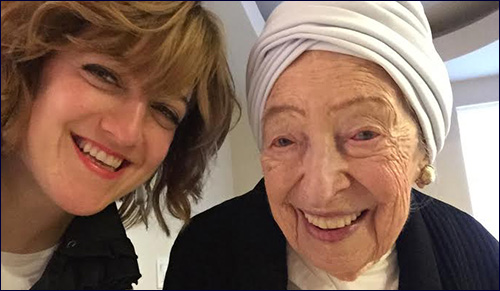 Iran’s Attack on Israel
Iran’s Attack on Israel


5 min read
6 tips for healthy bonding with your children.
Just last night I was talking to a friend who asked me how Omi is doing. Sadly, I had to tell her of my grandmother’s passing almost three weeks ago, just shy of 100 years old. She was a regal woman with tremendous warmth and grace and was a constant presence in my life.
 As the youngest granddaughter growing up in the same Brooklyn neighborhood, Omi was my de facto babysitter. When my parents had a wedding, bar mitzvah, or out-of-town trip I would go to Omi’s apartment, often sleeping overnight. Omi and I spoke almost daily throughout my life (I am now a mother of three), and she was the person I turned to for inspiration, solace, or an emotional hug.
As the youngest granddaughter growing up in the same Brooklyn neighborhood, Omi was my de facto babysitter. When my parents had a wedding, bar mitzvah, or out-of-town trip I would go to Omi’s apartment, often sleeping overnight. Omi and I spoke almost daily throughout my life (I am now a mother of three), and she was the person I turned to for inspiration, solace, or an emotional hug.
To most of the world she was known as Frieda Kalter. Born in 1915, Omi was lucid up until her last day in the hospital. Shortly before she died, I reminded her that she’d promised to dance at an upcoming family wedding so she had to stay with us. “Miriam,” she said, “you know we can’t be greedy.”
It was due in no small part to my strong attachment to Omi that I became interested in pediatric development, specifically, children’s behavior, and made behavioral occupational therapy my career. The substance of what I do is help parents and children discover healthy ways to bond, in the way that’s unique to and required of their particular relationship. Each parent-child relationship has to take into account the child’s development level, and their individual abilities and predilections as well as their parent’s.
This is what Omi did for me—she intuited what I was capable of, yet allowed me to grow, never holding me back.
These are the things I learned about healthy attachment from Omi, and they hold as true in my practice as they do in my personal life:
1. Be sensitive to your child’s feelings: Omi responded sensitively to my distress, and never made fun of or belittled what was important to me. She provided comfort, not criticism, when things didn’t go as I had hoped. It isn’t always easy to relate to your child’s worries and disappointments, especially when they’re little, but letting your child know you understand he’s feeling sad or angry without dismissing or invalidating him is vital to the development of secure attachment.
2. Let your child know you’re there: Omi always checked in on me from time to time, whether I was sleeping in the other bed in her bedroom or travelling around the world. By just showing her face or making a quick call, she let me know she was there for me. She was always there "behind the scenes" to provide support. Just knowing you’re there will give your child a sense of security. For example, for a toddler a hug or eye-contact across a crowded playground; for a child, a touch on the shoulder, hug, or just being present as they tell you what happened in school that day, and for a teen, a quick text can help them feel loved and supported.
3. Give age appropriate assistance (and know when to step back): Omi allowed me to do my own thing without trying to take over and micromanage. She never undermined my confidence or stifled my growth by doing things for me that I was capable of myself. Whether your child is about to take his first step or graduate from high-school, allow him the space he needs to try out his skills and discover new ones.
4. Offer encouragement: Omi was a constant source of encouragement and was accepting of my goals. She allowed me space to make mistakes yet never made me feel my mistakes defined me or made me “bad.” She boosted my self-esteem and this sense of basic self-worth has sustained me through some pretty hard times. Encourage your child; let him know that his worth as a human being isn’t defined by his failures or his achievements.
5. Don’t make unreasonable demands: Sometimes I forgot to call Omi even though we had an unspoken, loving (and no pressure) agreement that we would touch base daily. So, Omi would call me. She was never one to stand on formalities despite her dignified bearing—and love beat out rigidity every time. Find that loving place, somewhere between best friend and ruling overlord and parent from there. Sure, respect is essential to any relationship, especially the respect a child should feel for his parent, but sometimes it’s more important to let the rules slide.
6. Tell them you love them unconditionally as well as specifically: Omi told me frequently that she loved me and was proud of me. It was not lip service, she meant it every time. Her love taught me how to be there emotionally for my own children and my clients, and how to love them, valuing them for the precious beings they are rather than projecting my own wishes on them. Think about the wonderful qualities your child has. Is she generous? Is he willing to try new things? Is she loving or tidy or gentle? Does he make you laugh? Remind yourself often about your child’s unique good points (especially when he’s having a rough day) and let him know you love him for who he is. Yes, a parent’s love is unconditional, but it can also be specific. Your child needs both kinds.
May the neshama of Frieda Bas Mordechai have an aliyah.
